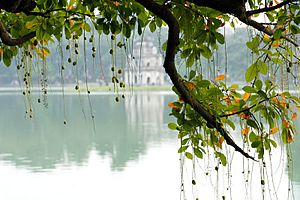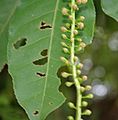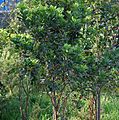Freshwater mangrove facts for kids
Quick facts for kids Freshwater mangrove |
|
|---|---|
 |
|
| A Barringtonia acutangula tree on the Hoan Kiem Lake | |
| Conservation status | |
| Scientific classification | |
| Kingdom: | |
| (unranked): | |
| (unranked): | |
| (unranked): | |
| Order: | |
| Family: |
Lecythidaceae
|
| Genus: |
Barringtonia
|
| Species: |
B. acutangula
|
| Binomial name | |
| Barringtonia acutangula |
|
| Synonyms | |
|
|
Barringtonia acutangula is a special tree found in wet areas near coasts in parts of Asia and Australia. You might hear it called the freshwater mangrove, itchytree, or mango-pine. It grows in places like Afghanistan, the Philippines, and Queensland in Australia.
About This Tree
This tree is quite large, growing to be about 8 to 15 meters (26 to 49 feet) tall. Its leaves are thick and smooth, shaped like ovals. They are usually about 8 to 12 centimeters (3 to 5 inches) long and 4 to 5 centimeters (1.5 to 2 inches) wide. The stems that hold the leaves are a reddish color.
The plant has long, hanging clusters of many large, white flowers. These clusters can be up to 50 centimeters (20 inches) long. After the flowers, the tree grows oval-shaped fruits. Each fruit is about 3 centimeters (1 inch) long and holds one seed inside.
How People Use It
As Food
The young leaves of this tree can be eaten. For example, in Vietnam, people eat them fresh. They often enjoy the leaves with other vegetables, meat, and shrimp.
For Medicine
Scientists have studied this plant for its possible medicinal uses. Research has shown that parts of the plant might help fight certain types of sickness. For instance, extracts from the seeds have been studied for their ability to fight tumors. Other parts of the plant may have properties that help stop the growth of bacteria like Helicobacter pylori, which can cause stomach problems.
The tree's bark is known to contain natural painkillers. In the past, people in India used parts of the tree for different health issues. An old book from 1889 mentions that a juice from the leaves, mixed with oil, was used for skin rashes. Powdered kernels from the fruit were mixed with sago and butter to help with diarrhea. When mixed with milk, they could cause vomiting. The root was thought to be bitter and was used for its cooling and cleansing effects.
Photos
-
in Kolkata, West Bengal, India.
-
fruits in Kolkata, West Bengal, India.
-
fruits in Kolkata, West Bengal, India.
-
flower buds in Kolkata, West Bengal, India.
-
Tree in Hyderabad, India.
-
Flowers in Hyderabad, India.
-
Flowers in Hyderabad, India.
-
Flower buds in Hyderabad, India.
-
Flowers in Hyderabad, India.
See also
 In Spanish: Barringtonia acutangula para niños
In Spanish: Barringtonia acutangula para niños
 | Janet Taylor Pickett |
 | Synthia Saint James |
 | Howardena Pindell |
 | Faith Ringgold |












